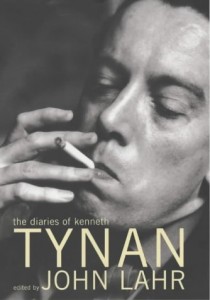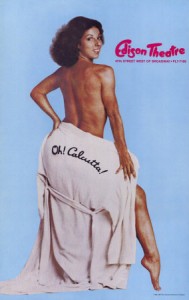Book Review: Kenneth Tynan — A Critic’s Decline
“The Diaries of Kenneth Tynan” provides literate entertainment and cautionary tales about what happens to a critic when the will-to-celebrity triumphs over the urge-to-critique.
The Diaries of Kenneth Tynan Edited by John Lahr. Bloomsbury, 439 pages.
By Bill Marx
Kenneth Tynan’s descent from brilliance to muddle is a fable for theater critics, a cautionary tale about the triumph of the will-to-celebrity over the urge-to-critique. Truth is, reviewers are easily rattled by self-hatred, a sense of worthlessness heightened by a primal curse. Inevitably, they dependent on what art the times serve up, which is more often than not disappointing. So critics long to shape the theater scene not by just commenting on its flaws from afar but also hoping to alter the depressing status quo. In addition, critics often internalize the popular anathema against judgment; they chafe at the demand to be disinterested. Some go so far as to trade in outsiderdom for the more glamorous and ego-satisfying chance to play mover and shaker, show biz insider, and big-time artist. There are even critics who keep big foots in both camps: criticism and boosterism.
The catch is that for every George Bernard Shaw who leaves reviewing and makes first-rate art, there are ten critics who settle for snug mediocrity, congratulating themselves for becoming ‘creative’ or taking up the ‘positive’ role of a parasitical puffer in the entertainment industrial complex. Given the low level of criticism, most changes of venue aren’t much of a loss to reviewing. But Tynan’s exit from theater criticism in 1961 made a difference. The sharp intelligence and dexterous wit in The Diaries of Kenneth Tynan, albeit proffered amid gossip, hosannas to sexual sadism, and radical chic windbaggery, testifies to it. For all of its high amusement value, this is a sad book about waste and delusion.
More than anyone else in his time, Tynan set the bar for post-war theater reviewers: “The critic’s job — at least 9/10th of it — is to make way for the good by demolishing the bad.” During the ’50s and early ’60s, Tynan more than lived up to his golden rule, dispensing linguistic dynamite in Observer reviewers that were “light, stinging, insolent, and melancholy.” No critic wrote better about the risks and splendors of acting; none caught the aura of a performer’s charisma or the pizzazz of a theatrical event with more loving, clever, or rigorous words. Alas, as editor John Lahr points out in his introduction to The Diaries of Kenneth Tynan, criticism doesn’t have much of a shelf life. Tynan’s superb collections of reviews are out of print. Still, even in the form of the celebrity profiles Tynan wrote for The New Yorker after he turned his back on reviewing, puffery doesn’t hang around long. That is a lesson Lahr doesn’t think is worth pointing out, but it is one of the most interesting implications of the book.
After covering one of the most exciting decades in British theater, contributing to the surge of new playwrights with a career-launching review of Look Back in Anger, Tynan grew tired of pulverizing the bad. He left reviewing for good, though there were invitations to return, including an offer from New York Magazine. His first gig was as dramaturge for the fledgling National Theatre, where he was used and abused by artistic director Laurence Olivier, who comes off as a befuddled self-serving duffer in these pages.
The Diaries of Kenneth Tynan begin in the early ’70s, with the former critic voicing disgruntlement at the limitations of his experience at National Theatre; he discovered only one major playwright, Tom Stoppard. Tynan is let go by Oliver’s replacement, Peter Hall, and begins to flounder financially and intellectually. Over the next decade, Tynan reneges on multiple book contracts, scrambles for funds to direct a pornographic film, and completes a sequel to his inane, and now tame, sex show Oh! Calcutta! Profiles for The New Yorker and other publications could not maintain an expensive lifestyle that included chewing down at four star restaurants, schmoozing with celebrities, and visits to his mistress, who was handy with a cane. On top of that, his health continued to decline.
The Diaries of Kenneth Tynan suggests that the writer still had the chops to write superb reviews, though as the ’70s go by, his knee-jerk Marxist-Brechtianism curdles into parody, a ‘radical’ reflex that erodes his gift for pointed playfulness. Part of what made him such a readable critic is that his reviews marry mischievousness with earnestness. In his Diaries Tynan questions a staging of Henrik Ibsen’s John Gabriel Borkman because it focuses on the wealthy capitalist, not the workers who made him rich. His crush on the work of freaky sexologist Wilhelm Reich reinforces your sense of his fatal lack of skepticism about his own hobbyhorses, a surprising lack of self-criticism in such a fine reviewer. It may explain his inability to control his sexual obsessions — he preferred the pleasures of self-flagellation (routinely berating himself for his laziness and weakness), rather than the taking up the challenges of more moderate scrutiny. Even in despair, Tynan didn’t want to be bored.
The best entries are not personal but speculative. These include keen aphorisms (“Contentment is always bought at the price of one’s liberty: that is what distinguishes it from happiness”), silly puns (“A pustulant = a nun with acne”), and bracing tirades about the wizened state of the arts and reviewing. Tynan is spot on about stage directors who love their concepts too much: “The actors are so busy fitting the interpretation that they forget to be interesting or charming or funny. It is not enough to be right in the theatre, to be lucid in exposition and loyal to the author’s subtext. You must also be exciting.” Ironically, Tynan wishes, more than once, for a version of himself — the tongue-lashing demolisher, to appear on the scene.

Kenneth Tynan: His diaries leave the impression of a talented writer who stopped what he could do magnificently for what he either couldn’t do as well or wasn’t worth doing in the first place
His literate appreciations of veteran performers remain trenchant and affectionate. The volume includes agile homages to the final years of Phil Silvers, Ethel Merman, and British comedian Max Wall, whose worn face earns this memorable description: “It’s a condemned playground, a fever-chart of intense but utterly unfelt emotions: the jaw swivels in cartooned disgust as a gag fails, or the lips project into a totally false V-shaped smile that shades into a conniving wink before collapsing into a nauseated scowl.”
To find excellent stuff like this you have to deal with chunks of guff. Tynan knew that fretting about his doubts was self-indulgent, but couldn’t help dramatizing his fears anyway. There’s much too much about Tynan’s pathetic obsession with the joys of caning: “A humanist is someone who remembers the faces of the people he spanks.” Those hungry for salacious scuttlebutt about the high and mighty will find plenty here about the sex lives of, among others, Warren Beatty, playwright John Osborne (Tynan suspects he likes spanking), Gore Vidal, and Marlene Dietrich, the latter telling Tynan a yarn about banging President Kennedy in the White House. Much of this comes off as stale title tattle that pales before the crisp passion of Tynan’s views on theater, which thin out by the time he moves to California in 1976. The Diaries end in 1980 with Tynan’s death at the age of 53 from pulmonary emphysema.
The Diaries of Kenneth Tynan leaves the impression of a talented writer who stopped what he could do magnificently for what he either couldn’t do as well or wasn’t worth doing in the first place. Often depressed, he writes in a 1974 December entry that: “One reason I cannot write nowdays is that I no longer have a stance, an attitude, what Eliot called in a letter to Lytton Strachey, ‘the core of it — the tone.'” Without a critical edge, an audience for his judgments, he floundered. Instead of giving up cigarettes, which were killing him, Tynan chose to take injections from sheep glands, so he would look as healthy as the other beautiful people in La La Land. Tynan exhausted himself by trying to live, spiritually and financially, on what, after all, is only 1/10th of a critic’s job — hawking the goods.
Bill Marx is the Editor-in-Chief of The Arts Fuse. For over three decades, he has written about arts and culture for print, broadcast, and online. He has regularly reviewed theater for National Public Radio Station WBUR and The Boston Globe. He created and edited WBUR Online Arts, a cultural webzine that in 2004 won an Online Journalism Award for Specialty Journalism. In 2007 he created The Arts Fuse, an online magazine dedicated to covering arts and culture in Boston and throughout New England.



